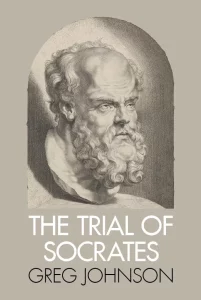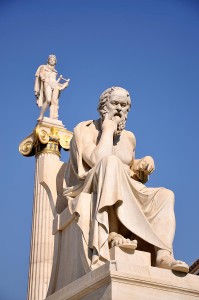Sophistry as Technocracy
In Greece in the fourth and fifth centuries BCE, the sophists were highly-prized teachers of the art (techne) of rhetoric. The Greek word for art (techne) is the root of our words technique and technology.
Socrates was widely seen as a sophist, for instance in Aristophanes’ Clouds. To a naïve bystander, Socrates certainly looked like a sophist. Like the sophists, Socrates spent a great deal of time arguing about ideas. Moreover, Socrates was seen arguing with known sophists, including the greatest sophists of them all, Gorgias and Protagoras, as depicted in the Platonic dialogues which bear their names. But if one looks at Socrates’ actual arguments with sophists, it becomes clear that he was fundamentally opposed to sophistry.
But why would a philosopher be especially bothered by those who practice and teach the art of rhetoric — as opposed, for instance, to medicine or shipbuilding or shoemaking? Philosophy, for Socrates and Plato, was the loftiest of all pursuits, far more important than any of the arts (technai).
Indeed, in the Platonic dialogues Socrates takes great pains to differentiate philosophy from all the arts. Philosophy, like all the sciences and arts, has a particular aim. The very name “philosophy” means the love (philia) of wisdom (sophia). For Socrates, wisdom is like the arts insofar as they are all primarily practical. They aim at changing things. But wisdom differs from the arts in two essential ways.
First, the arts as well as theoretical sciences are specialized. They deal with delimited realms of things: shoemakers make shoes; shipbuilders make ships; biologists study living things; geometricians deal with points, lines, and figures. Philosophy pursues wisdom, but wisdom is comprehensive. It deals in some way with all things.
Second, the arts, like the theoretical sciences, are morally neutral, meaning that they can be used for good or evil purposes, but these purposes are extrinsic to the arts and sciences themselves. They are added on by whomever makes use of them. Wisdom, however, is not morally neutral. It is inherently moral. Wisdom by its very nature aims at the good, specifically the good life for man.
If you put together wisdom’s comprehensiveness and its inherent directedness to the good, one arrives at the Socratic idea of wisdom: Wisdom is the ability to make right use of all things. “All things” means: all arts, all sciences, all the circumstances life deals us.
Ask yourself what are the components of a good life. What are the things you need to live well? There are material goods such as food and drink, physical qualities such as health and good looks, relationships such as family and friends, and resources such as money, social capital, knowledge, and skills.
But Socrates would say that even the best package of goods is not enough for a good life if they are not used rightly to attain well-being, which is why we also need wisdom to have a good life.
Socrates would add that once you realize the importance of wisdom, even if fortune gives you very few components of the good life, if you use what you have wisely, you will be better off than more fortunate people who use their gifts badly.
We’ve all heard the phrase “too much of a good thing.” Too much food and drink — even just water — can kill you. As Paracelsus said, “The poison is in the dose.” The same substances can cure or kill depending on how they are used. Can there be too much pleasure? Of course there can be. We can enslave and bestialize ourselves in the pursuit of pleasure. Is it really possible to be too rich for one’s own good? Yes, if you don’t use your money rightly. If you spend your money on cocaine and heroin, you’d be better off poor. Is it possible to be too talented or too good-looking? Yes, if you surround yourself with sycophants who encourage your worst behaviors. Is it possible to be too smart for your own good? Of course it is, if you use your intelligence to delude yourself and others. Can you be too industrious? Absolutely. The most destructive people in the world are industrious cranks and kooks.
Can one lead a good life without wisdom? Yes, but only if one is extremely lucky. There is such thing as a fool’s paradise. But one would be foolish to count on luck, since wisdom allows us to make our own luck; indeed, to counteract misfortune and salvage a happy life from even the worst circumstances.
But is it possible to be too wise for your own good? No, it is not possible. Wisdom is always good. Wisdom not only regulates all other things to bring about well-being, it needs no external regulation because it is by its very nature directed to the good. So if you are counting on something to lead to well-being, and it fails, is was not wisdom, but a mere counterfeit.
Because wisdom is the path to well-being, and — as Socrates maintains — well-being is what all men are seeking, wisdom is the most important thing we can pursue.
This means that nothing is more dangerous to human well-being than counterfeit wisdom. This is why Socrates deigned to cross swords with the sophists. Socrates believed the sophists were promoting a counterfeit wisdom as the path to well-being.

You can pre-order Greg Johnson’s The Trial of Socrates here.
Let’s look at Socrates’ conversation with the elderly and renowned sophist Gorgias of Leontini in Plato’s Gorgias. Socrates asks Gorgias what art (techne) he teaches. Gorgias says rhetoric (rhetorike).
The Gorgias distinguishes between masters of a techne and people who possess it merely though a “knack” (empeiria), from which we get the word “empirical,” meaning what is related to experience. In eighteenth-century English, an “empiric” referred to a charlatan or quack who practiced medicine based solely on experience. Masters of an art don’t merely have a knack. They have also taken a step back from their skills, reflected upon them, and articulated general principles. This allows them to make intelligent speeches (logoi) about their arts, which allows them to teach their art to others rather than just bidding them to learn by imitation and practice.
When Socrates asks Gorgias what rhetoric deals with, he says “speeches” (logoi). Socrates then asks Gorgias to distinguish the speeches rhetoric deals with from the logoi of other arts like medicine and physical training. At this point, Gorgias could introduce a distinction between the form and content of speeches. Rhetoric could deal with all kinds of speeches, but it could focus on their common formal qualities rather than their particular contents. Aristotle, for instance, takes this route, focusing on the formal properties of all persuasive logoi: logic, dialectic, and rhetoric. For Aristotle, rhetoric can be defined as the study of the techniques of persuasion about human affairs.
Gorgias, however, does not take this route. Instead, he claims that rhetoric differs from other technai in that it consists entirely of speeches, without any grubby hands-on work. Socrates points out that this does not distinguish rhetoric from mathematics. Besides, it still doesn’t say what rhetoric is about.
Gorgias then says that rhetoric is about the greatest of human concerns. But Socrates points out that other arts make the same claims about health, money, etc. Besides, Gorgias doesn’t actually say what this greatest good is, so Socrates asks, “What is this thing that you claim is this thing that is the greatest good for humankind, a think that you claim to be a producer of?” (452d).[1]
Gorgias replies: “The thing that is in actual fact the greatest good . . . It is the source of freedom for humankind itself and at the same time the source of rule over others in one’s own city” (452d). Rhetoric produces the greatest good by teaching
. . . the ability to persuade by speeches judges in a law court, councilors in a council meeting, and assemblymen in an assembly or in any other political gathering that might take place. In point of fact, with this ability, you’ll have the doctor as your slave, and the physical trainer, too. As for this financial expert of yours, he’ll turn out to be making more money for somebody else instead of himself; for you, in fact, if you’ve got the ability to speak and to persuade the crowds. (452e)
The art of rhetoric literally gives one the power to enslave the practitioners of all the other arts, because rhetoric allows one to grasp the levers of political power, which regulate the whole of the society.
Later in the dialogue, Gorgias argues that rhetoric actually gives one the power to persuade people about every other art better than those who know and practice those arts themselves. An orator who knows nothing about medicine is capable of persuading a patient to take his medicine better than the doctor who knows why the medicine is necessary. Socrates finds this power spooky, to which Gorgias says, “Oh yes, Socrates, if only you knew all of it, that it encompasses and subordinates to itself just about everything that can be accomplished” (456a).
At this point, it becomes clear how sophistry is a counterfeit of philosophy.
The sophists teach the art of rhetoric, understood as the pursuit of the best life for mankind: freedom for oneself and power over others. Gorgias actually defined “virtue” as “the capacity to rule over people” (Plato, Meno, 73c–d). One attains freedom for oneself and power over others through politics.
Philosophers also pursue the best life for mankind. They, too, understand the good life in terms of virtues like justice, courage, and temperance. But for Socrates and Plato, the best life for man is apolitical rather than political. Genuine freedom for oneself is inconsistent with power over others.
Once the art of rhetoric lets you grasp political power, you can “encompass and subordinate” all other arts, as well as all sciences, and indeed all the goods produced in society. Beyond that, rhetoric has the power to make lesser arts effective by making them more persuasive than genuine truth and skill.
Philosophy has a similarly lofty position vis-à-vis the arts, sciences, and all the goods of the world. Wisdom encompasses and subordinates all things, making them effective producers of well-being by using them rightly.
Gorgias, however, hastens to make clear the crucial distinction between sophistry and philosophy. Rhetoric, he says, is morally neutral. It can be used for good or ill. Thus, teachers of rhetoric such as Gorgias cannot be held responsible for the uses to which their students put it.
Sophistry was more than the art of rhetoric. It was the art of rhetoric joined with a political ideology that can be called technocracy, which means the rule of techne, which basically means the rule of experts, who can scientifically understand and technically manage human existence.
Technocracy is dangerous, however, because it accumulates power but not wisdom. Because it is morally neutral, it can’t answer the question, “Can there be too much power, too much control?” It can’t set limits to itself. It lacks wisdom’s exclusive orientation to the good, without which the all-encompassing and all-subordinating power it commands cannot reliably produce well-being for ruler or ruled alike. The problem with technocracy is that it can rule everything but itself.
* * *
Like all journals of dissident ideas, Counter-Currents depends on the support of readers like you. Help us compete with the censors of the Left and the violent accelerationists of the Right with a donation today. (The easiest way to help is with an e-check donation. All you need is your checkbook.)
For other ways to donate, click here.
Note
[1] Plato, Gorgias, trans. Donald J. Zeyl, in Plato: Complete Works, ed. John M. Cooper (Indianapolis: Hackett, 1997).




